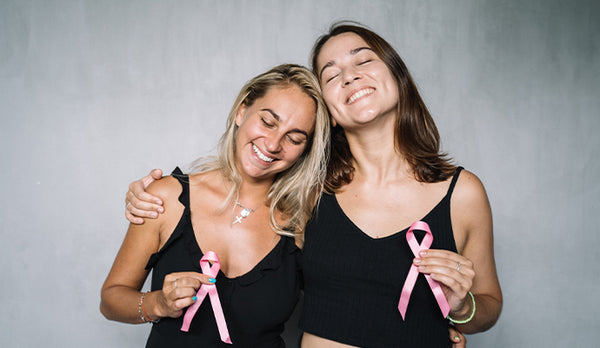
Resources: National Breast Cancer Foundation, Inc. , MD Anderson, CDC
October is here and with it comes Breast Cancer Awareness Month, an entire month dedicated to both raising awareness of the disease and also promoting prevention. It's so important for all women, no matter your age, to practice regular self breast exams. They could potentially save your life!
Breast cancer grows when a cell's DNA is damaged, and these damaged cells begin to rapidly reproduce. Aggressive cell growth in the breast can form a mass of tissue, or tumor. These abnormal groups of cells can progress into what is known as cancer, and 1 in 8 women in the United States will be diagnosed with breast cancer in her lifetime.
So how often should we check ourselves? Once a month! 7 to 10 days after your menstrual period begins, to be precise. Use your hand to feel the skin firmly around your breasts, looking for any inconsistencies. Inconsistencies may look like changes in breast tissue size, lumps, "dimpling or puckering of the breast, inversion of the nipple, redness or scaliness of the breast skin, redness or scaliness of the nipple/areola area, or discharge of secretions from the nipple." MD Anderson
If any of these unusual features are found, it is important to contact your doctor immediately. Most lumps found in the breast area are benign, but it's crucial to have a professional evaluation to be certain that they aren't cancerous. Ask your doctor about possibly using a mammogram, or x-ray machine, to look for signs of breast cancer.

Breastfeeding Can Reduce the Risk of Developing Breast Cancer
“Research shows mothers who breastfeed lower their risk of pre- and post-menopausal breast cancer. And, breastfeeding longer than the recommended six months can provide additional protection,” says Lindsey Wohlford, wellness dietitian. MD Anderson
While breastfeeding, a women's body experiences hormonal changes during lactation that can delay their menstrual periods. This delay can reduce their overall lifetime exposure to estrogen, a hormone that can promote breast cancer cell growth!
It's recommended that breastfeeding should be done consecutively for at least 6 months to help reduce the risk of breast cancer. An obvious added bonus is that breast milk is full of many nutrients your baby needs, and helps to build their immune system. Your antibodies are passed through your milk to your child.
"Breastfeeding not only reduces your chances for developing cancer, but also your child’s. 'Evidence shows that it can help prevent your child from being overweight or obese later in life,' Wohlford says. 'Being obese puts a person at risk for many cancers. This includes pancreatic, postmenopausal breast, endometrial, esophageal, rectal and kidney cancers.'" MD Anderson
Physical exercise can also help reduce your risk of breast cancer. 30 minutes a day is recommended to boost your immune system and promote a healthier lifestyle!











Leave a comment